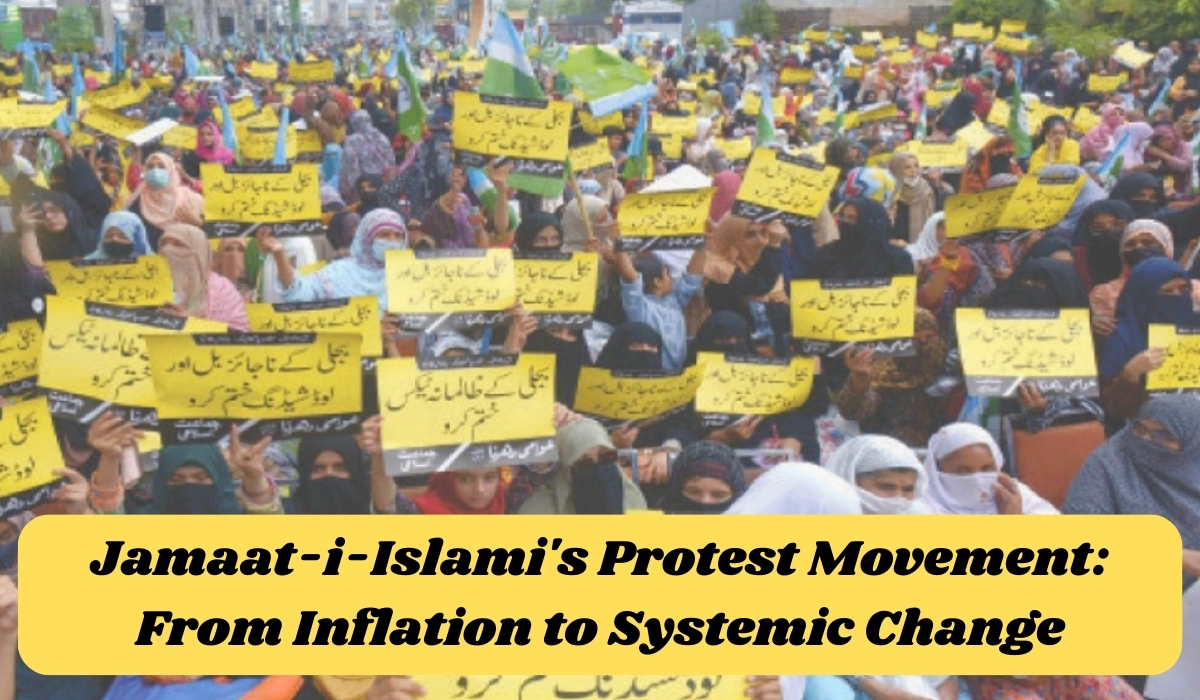Protest against Inflation by Jamaat-i-Islami’s for Systemic Change in 2024

Protest against Inflation – Introduction
The Jamaat-i-Islami (JI) party, led by chief Naeem ur Rehman, has initiated a series of protests starting with a sit-in at Liaquat Bagh in Rawalpindi. This movement is part of a larger strategy to address the economic issues faced by the people of Pakistan. The initial demands focus on price hike and inflated power bills, but JI plans to expand its movement to broader systemic changes. This article provides an in-depth look at the details of the protest, the demands made by JI, and the potential future phases of their movement.
The First Phase: Addressing Immediate Economic Issues
Inflation and Power Bills
- Economic Strain: The JI’s primary focus in the initial phase is on the economic strain caused by inflation and inflated power bills. These issues have placed a heavy burden on the average Pakistani, making it difficult for many to make ends meet.
- Sit-in at Liaquat Bagh: The sit-in at Liaquat Bagh in Rawalpindi, which has been ongoing for four days despite adverse weather conditions, marks the beginning of JI’s protest movement.
- Women’s Demonstration: In addition to the main sit-in, a women-led demonstration was organized on Murree Road, highlighting the inclusive nature of the protest and the active participation of women in the movement.
Key Demands
- Reduction in Electricity Bills: JI demands a significant reduction in the electricity bills, arguing that the current rates are unsustainable for the general population.
- End of Petroleum Levy: The party calls for the elimination of the petroleum levy, which has contributed to the rising costs of goods and services.
- Affordable Essentials: JI insists on the availability of essential goods at reasonable rates, making it easier for people to afford basic necessities.
- Fair Taxes on Traders and Exporters: The party seeks a fair taxation system for traders and exporters, reducing the financial burden on these sectors.
The Threat of Escalation
Potential Actions
Consultation with Stakeholders: JI plans to consult with traders, industrialists, and civil society to discuss further actions, including the possibility of refusing to pay electricity bills for August if they are higher than those in July.
Nationwide Protests: If the demands are not met, JI threatens to spread the protests across the country, making it difficult for the government to ignore their movement.
Sit-ins in Other Cities
- Karachi Sit-in: JI has announced plans to stage a sit-in outside the Governor House in Karachi starting Wednesday.
- Provincial Capitals: The party also intends to organize demonstrations in other provincial capitals, signaling a widespread and coordinated protest effort.
The Call for Systemic Change
Beyond Initial Demands
- Changing the System: JI’s movement is not limited to addressing immediate economic issues. The party aims to initiate a second phase that focuses on systemic changes within the country.
- Forensic Audit of IPPs: One of the key demands in this phase is a forensic audit of Independent Power Plants (IPPs). JI alleges that these plants are exploiting the people by charging high rates while using cheaper fuels like sugarcane waste instead of international coal.
Criticism of Government and Elite
- Government Inaction: Hafiz Naeem ur Rehman criticizes the government for its inaction on the issues of high electricity bills and others. He accuses the ministers of living luxurious lives while the general public suffers.
- Exploitation by IPPs: Rehman argues that the IPPs are exploiting the masses, and there is a need to scrutinize their agreements and operations.
Women’s Rights and Education
Advocacy for Women’s Rights
- Equal Rights: Rehman emphasizes that women, who make up 50% of the population, are not given their due rights. He stresses the importance of protecting and promoting women’s rights in all spheres of life.
- Educational Opportunities: He points out that women, especially in rural areas, have fewer opportunities for education. This lack of education limits their ability to advocate for their rights and improve their living conditions.
Criticism of the Punjab Government
- Privatization of Schools: Rehman criticizes the Punjab government for its plan to privatize 13,000 schools. He argues that the government should focus on providing quality education rather than relying on NGOs.
- Unified Education System: JI advocates for a unified education system with a single syllabus for both public and private schools. This approach aims to ensure equal educational opportunities for all children, regardless of their socio-economic background.
Conclusion
The Jamaat-i-Islami’s protest movement, led by Naeem ur Rehman, is a significant effort to address the economic and systemic issues facing Pakistan. Starting with a focus on price hike and inflated power bills, the movement aims to bring about broader changes that will benefit the general population. The inclusion of women in the protests and the emphasis on their rights highlights the inclusive nature of the movement. As the protests continue and potentially escalate, the government’s response will be crucial in determining the future course of these demonstrations.
References
- Dawn. (Date). JI eyes agitation beyond initial demands.
- The News International. (Date). JI protests against inflation, power bills.
- Express Tribune. (Date). JI’s sit-in at Liaquat Bagh enters fourth day.



One thought on “Protest against Inflation by Jamaat-i-Islami’s for Systemic Change in 2024”